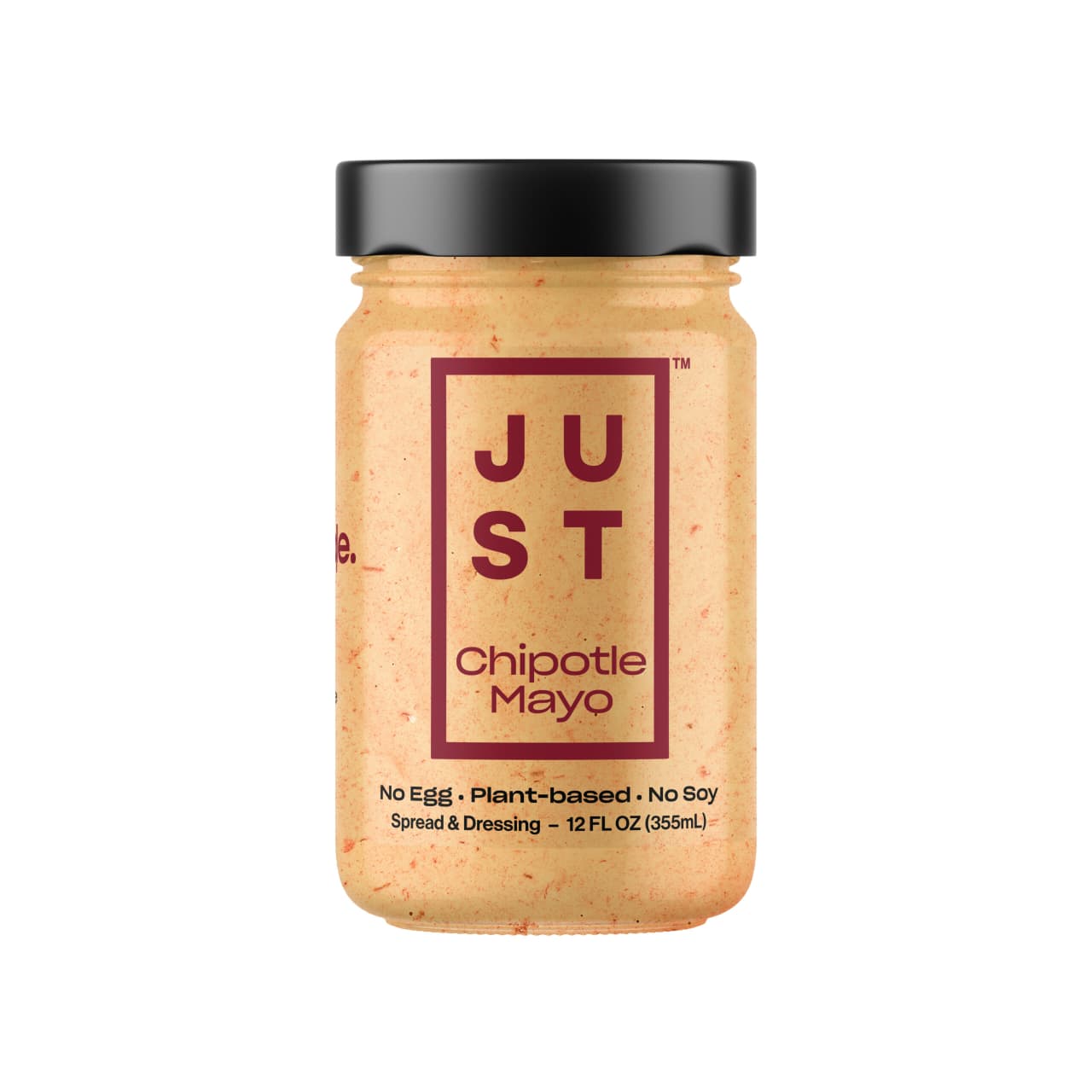Eat Just’s vegan Just Mayo is coming back. Here’s why
What is life without learning from our mistakes? For Eat Just, which is relaunching its popular and much-litigated mayo, this is a definite do-over. Ideally, it goes more smoothly for the embattled startup. Just Mayo hasn’t been on the shelves since 2019. But starting today, you can pick up a jar in two flavors—original and chipotle—in the refrigerated aisle of Whole Foods Market stores nationwide. Mayo is big money. It’s in almost every fridge in the country. Amazon Fresh reports that it’s the most purchased condiment in nearly every state. In 2023, sales were up 21%, to $2.6 billion, according to Circana data, on unit sales of 529.1 million. Globally, the market value for mayo hit $12.3 billion in 2022. Because of its ubiquity, every big food player seems to have its own version of the household staple, including Hellmann’s and Best (both owned by Unilever), Kraft Heinz, Kewpie, and Duke’s. On the vegan side, Just Mayo will compete with Vegenaise, Sir Kensington’s (also Unilever), and Primal Kitchen (owned by Kraft Heinz). For the sake of history, let’s take a quick glance back: Just Mayo, a creamy, cholesterol- and egg-free version of traditional mayo, was launched in 2013 to much enthusiasm—even though vegan mayo already existed on the market (see Vegenaise). After noticing all the press on what seemed to be merely a basic spread, Unilever got huffy and filed a lawsuit in 2014 “on the grounds that the term ‘mayo’ implied the use of eggs.” The consumer goods giant eventually backed down, apologized, and launched its own vegan mayo. This seemed like a win for Eat Just until the company’s employees were discovered buying up jars in an effort to boost sales. Then, possibly for this and other reasons, Target ended its relationship with the startup and removed the product from its shelves. Add in negative margins for the ultimate fail. If we had the time, we’d count how many words had been shed over this specific condiment, but we’ll ballpark it and say heaps. Despite doing “tens of millions in sales at the time,” is it any surprise that CEO Josh Tetrick discontinued the product in 2019? “Just Egg was a significant challenge that required all of our energy, including mine,” Tetrick says. “To enable it, we decided to do less.” That same year Just was beginning to see success with its egg product, and the company had secured a protein manufacturing facility in Appleton, Minnesota. The refocus was likely beneficial. To date, Just’s egg business has captured 99% of the vegan egg market because it’s good and there’s nothing like it commercially on the market. It may even get the startup into the black this year. Perhaps the mayo will pay off? Chris Jones, Eat Just’s VP of product development, is the key player behind Just Mayo. He’s been with the company since 2012, and along with his longevity comes experience. Jones thinks he’s eaten “over a thousand bites of mayo.” Maybe “10,000 bites?” he adds. Gross. “Health was important, but it had to be delicious,” he says. Mayo’s appeal is in its silky-smooth texture and creamy mouthfeel. All of this must be done without eggs, which are truly a magical ingredient. Instead, this is done mostly with canola oil, pea protein, water, and the right emulsification (a process of suspending two liquids). Getting it back on shelves—at a positive margin—was important for Just. “I’m really happy to see it come back,” Jones says. One day soon we may taste mayo made with mung bean protein, the protein used in Just Eggs. No word whether Target will carry it, but it does sell Just Eggs.

What is life without learning from our mistakes? For Eat Just, which is relaunching its popular and much-litigated mayo, this is a definite do-over. Ideally, it goes more smoothly for the embattled startup.
Just Mayo hasn’t been on the shelves since 2019. But starting today, you can pick up a jar in two flavors—original and chipotle—in the refrigerated aisle of Whole Foods Market stores nationwide.
Mayo is big money. It’s in almost every fridge in the country. Amazon Fresh reports that it’s the most purchased condiment in nearly every state. In 2023, sales were up 21%, to $2.6 billion, according to Circana data, on unit sales of 529.1 million. Globally, the market value for mayo hit $12.3 billion in 2022.
Because of its ubiquity, every big food player seems to have its own version of the household staple, including Hellmann’s and Best (both owned by Unilever), Kraft Heinz, Kewpie, and Duke’s. On the vegan side, Just Mayo will compete with Vegenaise, Sir Kensington’s (also Unilever), and Primal Kitchen (owned by Kraft Heinz).
For the sake of history, let’s take a quick glance back: Just Mayo, a creamy, cholesterol- and egg-free version of traditional mayo, was launched in 2013 to much enthusiasm—even though vegan mayo already existed on the market (see Vegenaise). After noticing all the press on what seemed to be merely a basic spread, Unilever got huffy and filed a lawsuit in 2014 “on the grounds that the term ‘mayo’ implied the use of eggs.”
The consumer goods giant eventually backed down, apologized, and launched its own vegan mayo. This seemed like a win for Eat Just until the company’s employees were discovered buying up jars in an effort to boost sales. Then, possibly for this and other reasons, Target ended its relationship with the startup and removed the product from its shelves. Add in negative margins for the ultimate fail. If we had the time, we’d count how many words had been shed over this specific condiment, but we’ll ballpark it and say heaps.
Despite doing “tens of millions in sales at the time,” is it any surprise that CEO Josh Tetrick discontinued the product in 2019? “Just Egg was a significant challenge that required all of our energy, including mine,” Tetrick says. “To enable it, we decided to do less.” That same year Just was beginning to see success with its egg product, and the company had secured a protein manufacturing facility in Appleton, Minnesota.
The refocus was likely beneficial. To date, Just’s egg business has captured 99% of the vegan egg market because it’s good and there’s nothing like it commercially on the market. It may even get the startup into the black this year. Perhaps the mayo will pay off?
Chris Jones, Eat Just’s VP of product development, is the key player behind Just Mayo. He’s been with the company since 2012, and along with his longevity comes experience. Jones thinks he’s eaten “over a thousand bites of mayo.” Maybe “10,000 bites?” he adds. Gross.
“Health was important, but it had to be delicious,” he says. Mayo’s appeal is in its silky-smooth texture and creamy mouthfeel. All of this must be done without eggs, which are truly a magical ingredient. Instead, this is done mostly with canola oil, pea protein, water, and the right emulsification (a process of suspending two liquids). Getting it back on shelves—at a positive margin—was important for Just. “I’m really happy to see it come back,” Jones says.
One day soon we may taste mayo made with mung bean protein, the protein used in Just Eggs. No word whether Target will carry it, but it does sell Just Eggs.






















